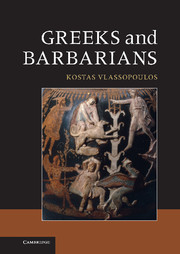Book contents
- Frontmatter
- Contents
- List of Maps and figures
- Acknowledgements
- Note to the reader
- List of Abbreviations
- 1 Introduction
- 2 The Panhellenic world and the world of empires
- 3 The world of networks and the world of apoikiai
- 4 Intercultural communication
- 5 The Barbarian repertoire in Greek culture
- 6 Globalisation and glocalisation
- 7 The Hellenistic world
- 8 Conclusions
- Bibliography
- Index locorum
- Index
8 - Conclusions
Published online by Cambridge University Press: 05 June 2013
- Frontmatter
- Contents
- List of Maps and figures
- Acknowledgements
- Note to the reader
- List of Abbreviations
- 1 Introduction
- 2 The Panhellenic world and the world of empires
- 3 The world of networks and the world of apoikiai
- 4 Intercultural communication
- 5 The Barbarian repertoire in Greek culture
- 6 Globalisation and glocalisation
- 7 The Hellenistic world
- 8 Conclusions
- Bibliography
- Index locorum
- Index
Summary
One of the major arguments of this book is the necessity of dissociating the history of the relationship between Greeks and non-Greeks from the context of modern Orientalism and the modern confrontation between West and East. This implies challenging the identification of the modern Western scholar and reader with the ancient Greeks, seen as the originators of freedom and science in their confrontation with despotic and religious-minded Orientals; but it also challenges the identification of Greek attitudes towards Barbarians with the imperialist and colonialist attitudes of the modern West. There is no doubt that from the point of view of reception, both the inspiration from Greek democracy and freedom as well as the denigration of Oriental despotism and luxury are part of the history of the modern world; accordingly, scholars who work on the interaction between Greeks and non-Greeks cannot ignore these modern discourses and debates when conducting their research. But the mapping of the modern distinction between West and East onto the ancient interaction between Greeks and non-Greeks is deeply flawed, because it is deeply unhistorical. The Greeks did not confront the cultures of the Near East from the same standpoint as the Western imperialist societies confronting the modern Orient. When we remember that more Greeks fought on the Persian side in 480 or in 334, that Lydian and Thracian rulers received honours at Panhellenic sanctuaries such as Delphi, that Persian satraps received Athenian citizenship, that Carian rulers spread the institutions of the Greek polis, or the saga of the Greco-Persian family of Artabazus, it becomes obvious that the interactions between Greeks and non-Greeks took place in a world that was infinitely more complex than any simplistic distinction between West and East.
- Type
- Chapter
- Information
- Greeks and Barbarians , pp. 321 - 331Publisher: Cambridge University PressPrint publication year: 2013

